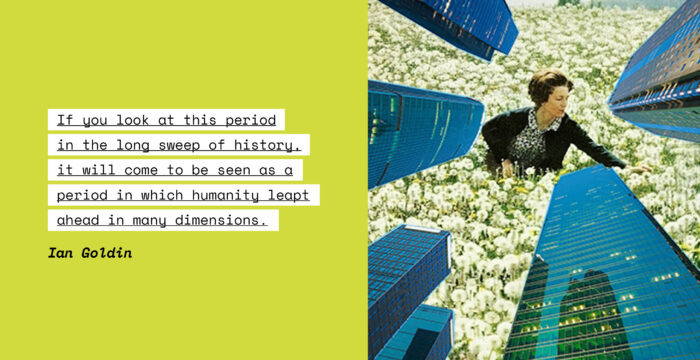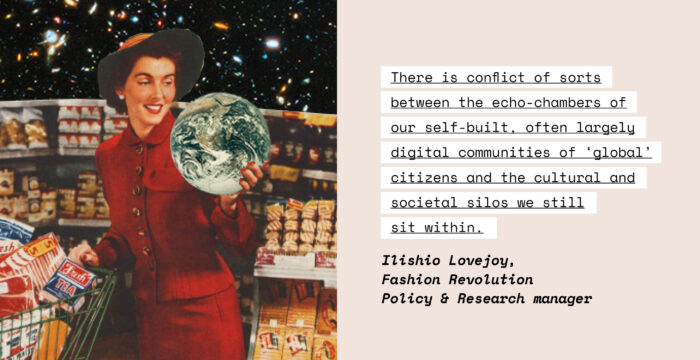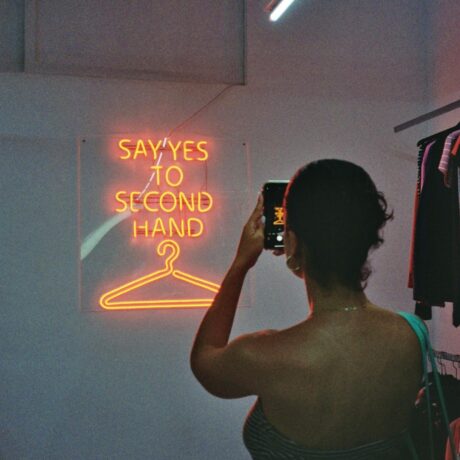Is shaming ourselves and others a barrier to a more sustainable future?
In 2018 sales from Black Friday and Thanksgiving generated $9.9 billion in online sales (1) and a PWC 2018 survey found that over 40% of respondents said they would be looking to buy clothes, shoes and accessories over the Black Friday weekend (2). Overconsumption is becoming an epidemic in many regions and the need to slow down is more apparent than ever before. Whilst we must start to pause to consider whether we truly need an item (and whether we’ll cherish it for a long time) before we purchase it we can also support change by not shaming others for their shopping habits this Black Friday and Festive season.
The current overconsumption epidemic, driven by the World’s richest and experienced by everyone else, has been largely driven by the proliferation of globalisation, which in turn has brought countless benefits to human wellbeing.
We have seen remarkable progress in life expectancy, the reduction of poverty, quality of life, access to nutrition and much more. According to Professor Ian Goldin, “If you look at this period in the long sweep of history, it will come to be seen as a period in which humanity leapt ahead in many dimensions. I attribute that largely to the coming down of walls and integration, which is how I define globalisation. It’s the flows between societies, principally the flow of ideas, that has led to these changes.” (3)

This significant progress for humanity has, on the other hand, contributed to issues such as climate change, natural resource depletion, unprecedented pollution and the destruction of biodiversity, to name a few. The Intergovernmental Panel on Climate Change have called for “rapid, far-reaching and unprecedented changes in all aspects of society” (4) in order to tackle such issues. Yet globalisation has also contributed to a new wave of desensitisation and self-absorption which is at odds with this necessary call to action.
During our leisure time, not counting work, each of us processes 34 gigabytes, or 100,000 words, every day (5). We are processing new information like never before. Much of this information is telling us what to be and how to live. We are continually encouraged to be the change we want to see in the world. We are told we are responsible for our health, diet, career, happiness and contributing to a better world for all. Buy less, buy better and go vegan. These are all notable revolutionary acts that contribute to a shift in cultural norms and in turn the way businesses and governments operate globally. These acts of activism, however great, are not effecting change at the speed and scale in which we need, as we are reminded on a daily basis by news headlines highlighting the fact that 50% of the worlds workers live below a $2 a day poverty line (6) and the destruction of rainforests and extreme weather behaviours destroying our home.
“You can’t manage globalisation at the local or national level alone. It needs management at those levels, and there’s a lot you can do, but you’re not going to solve climate change, pandemics, cyberterrorism or the problems of finance in one country. And that’s the tension.” says Professor Ian Goldin (7)
Simply put, we can achieve exponentially more together than we can accomplish alone, and this is where our challenge lies. There is conflict of sorts between the echo-chambers of our self-built, often largely digital communities of ‘global’ citizens and the cultural and societal silos we still sit within. On the one hand, we are more connected to wider communities than ever before, and on the other, we are so absorbed in these self-made worlds that we are isolating ourselves from others who think and act differently to us. Global algorithms connect us to people who think, live and act like us from around the world. People who likely reflect our values, wealth and opinions. We build communities online, rather than in our geographical locations. Technology even allows us to curate our communities, we cannot pick our neighbours but we can pick who we follow and share with so we still have a tendency to approach global issues from a rather narrow perspective.

We can tackle the climate crisis by taking fewer flights, after all they account for 2.5 percent of global carbon dioxide emissions (8) but considering that 80% of the world’s population have never flown (9), this becomes a fairly limited solution. We can shame ourselves and others for our flying habits, dietary habits or shopping habits (as I do to myself regularly) but in doing so are we unintentionally isolating ourselves within the 20% of people that can relate?
Considering that we have 10 years left to turn this ship around, 20% of us working in the same direction just isn’t going to cut it.
To create global change, we need global collective action and these silos are getting in the way. Whether that’s working together for a better fashion industry or voting for politicians who will take us into account as they adapt the rules of our future, we won’t be successful until there is a much larger group of us work together. We need inclusivity of cultural and societal groups, not only that of geographical locations.
Cultural and societal groupings are not new but what is new is the global scale of our problems. Climate change will continue to build bridges through consequences that know no boundaries and this will require global action. We need to think, and act, outside of these silos like never before. Could a shift away from shaming ourselves and others for their actions, such as Black Friday shopping habits, help us build a more connected and supportive movement able to make the changes we need a reality? Collective action isn’t a protest, although this is one way of demonstrating it. Collective action is so much more than that. It is unionising, problem solving, clothes swapping, it is sharing and innovating and it is voting.
Last month, Barack Obama chatted with Yara Shahidi about the state of activism. He said, “I get a sense sometimes now among certain young people, and this is accelerated by social media. There is this sense of ‘the way of me making change is to be as judgemental as possible about other people and that’s enough.’”
Focusing on the bigger picture isn’t an excuse to live a less thoughtful and considerate life, but it could help us focus our energy on the levers of change that will make the most difference.
Is there a time in history when division worked? NO. So, let’s work to make the fight for a more sustainable future an inclusive one; because this might just give us the power we to succeed.








